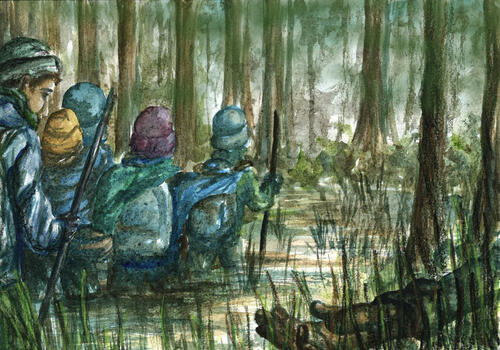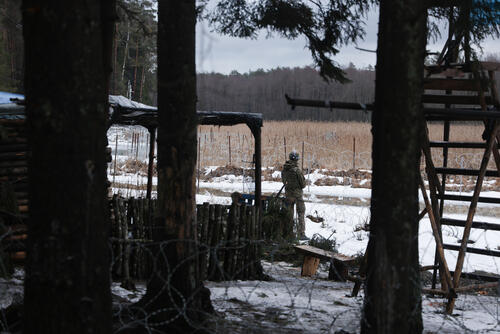Since summer 2021, thousands of people have travelled to Belarus with the aim of crossing into Latvia, Lithuania or Poland in search of peace and safety in the European Union (EU). The Belarusian government is alleged to have orchestrated the sharp increase in people attempting to cross into Europe in retaliation for EU sanctions. But whatever its origins, it is a fact that with few safe routes to Europe, and amid spiralling conflicts, escalating crises and deepening global inequality, Belarus has become a major transit country for people on the move.
Over recent years, people seeking safety in Europe have been dehumanised, manipulated by political rhetoric, and had their lives put at risk. Many of those who have succeeded in reaching Latvia, Lithuania, and Poland have found themselves forced back into Belarusian territory by border authorities, frequently with a violent practice known as pushbacks.
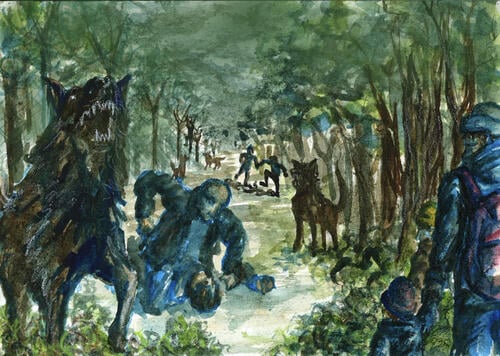
According to multiple testimonies by people on the move, EU border guards have opened fire on them, teargassed them, beaten them, stolen their valuables, destroyed their possessions and threatened them with tasers, dogs, metal rods, and chains. People also report being pushed back into Belarus through rivers, stripped of their clothing and forced to stand in their underwear for hours at night in the rain.
In addition to their mistreatment at the hands of EU border guards, people report having been beaten, assaulted and confined in camps and makeshift detention facilities by Belarusian border guards, and having been compelled to undertake crossing attempts into the EU against their will.
As reports emerged in 2021 of people on the move being criminalised, put in danger and denied access to healthcare, protection and assistance at Belarus’ borders with Latvia, Lithuania and Poland, Médecins Sans Frontières (MSF) launched responses in all four countries.
Prior to 2021, our teams had already worked in Belarus for several years in support of the National Tuberculosis Programme. In October 2021, our emergency team arrived in Belarus; over the following two years, we helped people on the move dispersed throughout the country to access healthcare. Through our activities in Belarus, we witnessed the consequences of abuse, mistreatment, and neglect on a precarious community of people trying to reach Europe, including unaccompanied children, families, women, and men. Many told our staff their stories.
We were caught by the Polish border guards... They were beating us brutally and until now I can’t breathe.A syrian man trying to cross into Poland
A Syrian man describes how he was violently pushed back to Belarus after crossing into Poland, “We were caught by the Polish border guards. They told us to take off our clothes and we stayed in our underwear and they made us sit on the ground,” he says. “They were beating us brutally and until now I can’t breathe... They were also using police sticks, and they took our phones and broke them, and that is the only way to be in contact with my family… And after they put us in the Belarus side.”
An Egyptian woman also describes her treatment by Belarusian police, “The Belarus police took us to a camp with them, all the group… and they hit the people, very much. After it, they asked me: ‘Why don’t you cross?’ We say: ‘It is very hard, we try, we can’t, we don’t have water, food.’ They told me: ‘You can’t come back, you should cross.’”
People travelling to Belarus in search of a route to the EU originate from a multitude of different countries, including places caught up in civil war and marked by unrest and insecurity. Many people who received assistance from MSF had travelled from Afghanistan, Syria, Yemen, Somalia, Democratic Republic of Congo, and Iran.
They described being forced to flee their countries of origin and to undertake desperate and costly journeys. Humiliated and manipulated by the people ostensibly helping them, they described the lies they were told before attempting their journeys and the extortion and abuse they faced en route.
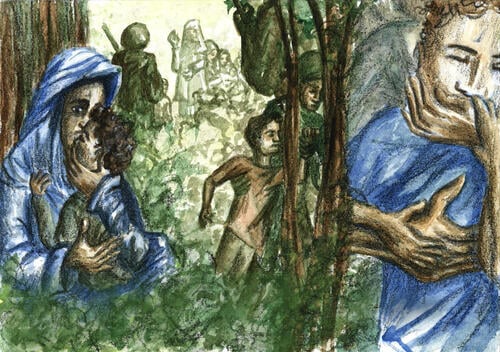
A Congolese man describes how he was misled about the journey ahead, “…They say: ‘You can go to Poland.’ This is my first time to travel. I didn’t know what Europe was. You are in Belarus; they say you are in Poland… I think they would give me a visa. And this visa will help us to go to Poland. You arrive and you can’t go back and you don’t know what to do. But they want to rob your money.”
People described having to walk through Belarus for days towards the border, camping out in forests and facing dangers along the way. A West African woman recalls,: “We walk at night, everywhere is dark… So many people die. We see bones, we see bones when we are walking… But we must cross the water, we must cross, and it is very, very deep.”
Many people told us that, following an attempt to cross the border, they were forced to return to Belarus, where they became stranded in towns or cities such as Minsk, living isolated lives in fear of deportation and the police. Most told our teams that they felt trapped and abandoned in Belarus and believed that the only choices open to them were to continue trying to cross into the EU or to live in hiding in Belarus.
We walk at night, everywhere is dark… So many people die. We see bones, we see bones when we are walking… But we must cross the water, we must cross, and it is very, very deep.A West African woman trying to cross into Poland
A Yemeni man describes his daily life in Belarus, “I cannot go outside. Most days I am in the apartment. I only stay in my room. I can see from my window a park – children are playing there. I want to go with my son, but I can’t.”
For two years, our emergency team in Belarus provided humanitarian assistance to people on the move and facilitated their access to medical and mental health support. From October 2021 to October 2023, our staff provided assistance to at least 2,000 people before or after they had attempted to cross the Belarus-EU border.
“Most people we helped have undertaken costly and hazardous journeys in search of peace and safety, but instead they have been caught up between hammer and anvil on the Belarus-EU border, denied access to healthcare, protection and assistance,” says Norman Sitali, MSF medical operations manager.
The majority of people assisted by our teams had particular vulnerabilities, and included injured people, pregnant women, mothers with young babies, people with chronic diseases, the elderly and children. MSF staff referred people for treatment for a variety of medical conditions, including frostbite from freezing temperatures, acute respiratory infections, chronic diseases, and physical trauma consistent with beatings and falls from the walls and fences which divide Belarus from its EU neighbours.
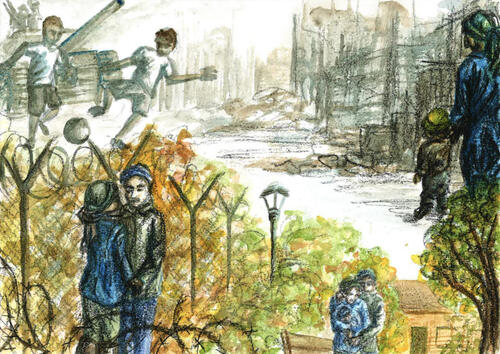
Over the past two years, our team in Belarus also ran a hotline for people on the move using a messaging application to send SOS alerts and requests for urgent medical assistance.
After two years of these activities, we found that the medical needs of people on the move were outweighed by their needs for protection and legal support, which requires the special expertise of dedicated organisations, including, but not limited to, UN agencies with mandates related to asylum and protection. With this in mind, we decided to conclude these activities in Belarus.
We believe that all people on the move in Belarus, Poland, Lithuania and Latvia have the right to healthcare, humanitarian assistance and dignity. MSF calls on the state authorities of Belarus, Poland, Lithuania and Latvia to immediately stop inflicting violence on people on the move in the border area dividing Belarus from the EU. People who arrive in the EU wishing to seek asylum or protection have the right to do so and should not be returned, violently or otherwise, to Belarus, while those who no longer wish to cross into the EU from Belarus should not be forced to do so. In addition, we call for aid agencies to be given access to the border areas to provide medical care and humanitarian assistance to people in need.
“We call for unhindered access to the border area for independent humanitarian organisations and for international and civil society organisations to respond to the dire situation there,” says Sitali. “UN agencies with mandates related to asylum and protection, international and national organisations, and responsible authorities in Belarus must fulfill their obligations to provide assistance and protection to people on the move. The brutalisation and abandonment of people on the move cannot be allowed to continue.”



